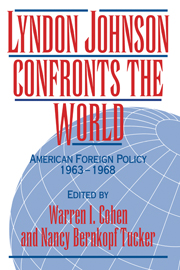Book contents
- Frontmatter
- Contents
- Dedication
- Acknowledgments
- List of Contributors
- Introduction
- 1 Lyndon B. Johnson: Change and Continuity
- 2 Johnson, Vietnam, and Tocqueville
- 3 “A Time in the Tide of Men's Affairs”: Lyndon Johnson and Vietnam
- 4 Threats, Opportunities, and Frustrations in East Asia
- 5 Toward Disillusionment and Disengagement in South Asia
- 6 Lyndon B. Johnson, Germany, and “the End of the Cold War”
- 7 The Promise of Progress: U.S. Relations with Latin America During the Administration of Lyndon B. Johnson
- 8 Keeping Africa off the Agenda
- 9 Balancing American Interests in the Middle East: Lyndon Baines Johnson vs. Gamal Abdul Nasser
- 10 Lyndon Johnson: A Final Reckoning
- Suggestions for Further Reading
- Index
1 - Lyndon B. Johnson: Change and Continuity
Published online by Cambridge University Press: 05 June 2012
- Frontmatter
- Contents
- Dedication
- Acknowledgments
- List of Contributors
- Introduction
- 1 Lyndon B. Johnson: Change and Continuity
- 2 Johnson, Vietnam, and Tocqueville
- 3 “A Time in the Tide of Men's Affairs”: Lyndon Johnson and Vietnam
- 4 Threats, Opportunities, and Frustrations in East Asia
- 5 Toward Disillusionment and Disengagement in South Asia
- 6 Lyndon B. Johnson, Germany, and “the End of the Cold War”
- 7 The Promise of Progress: U.S. Relations with Latin America During the Administration of Lyndon B. Johnson
- 8 Keeping Africa off the Agenda
- 9 Balancing American Interests in the Middle East: Lyndon Baines Johnson vs. Gamal Abdul Nasser
- 10 Lyndon Johnson: A Final Reckoning
- Suggestions for Further Reading
- Index
Summary
The eight years of the Lyndon Baines Johnson vice presidency and presidency were the culmination of his life and career, but they were not simply the consequences of what went before. To some extent we are the sum of what we have been, prefigured by genetics, shaped by home, environment, and early adulthood; the past explains us. Yet we change, too: needs, expectations, and capabilities shift; personalities alter and psyches realign to meet new demands; we learn and often grow. The stages and current circumstances of our life also define us.
Johnson's election as vice president in 1960 marked the most radical departure in his life and career since he entered the national government in 1931. The executive branch was fundamentally different from the legislative, as America in the 1960s was from America in the 1950s. Biographies of Johnson naturally dwell on his antecedents, early childhood, and Texas background, and the value of these dimensions for understanding his presidency is undeniable. Conclusions about the younger Johnson cannot be indiscriminately carried forward to the presidential years, however. He faced wholly new challenges when he arrived in the executive branch, and it seems reasonable to suppose that these elicited novel as well as familiar responses. Vice President and President Johnson were not necessarily the same as Senate Majority Leader Johnson. Whether this was particularly the case in foreign affairs, which occupied much less of his time and interest in Congress than in the White House, is a question: was he less innovative and adaptable in this unfamiliar terrain than in dealing with domestic problems?
- Type
- Chapter
- Information
- Lyndon Johnson Confronts the WorldAmerican Foreign Policy 1963–1968, pp. 9 - 30Publisher: Cambridge University PressPrint publication year: 1995
- 1
- Cited by



